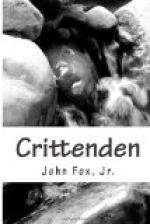* * * * *
And Crittenden was coming home—Colour-Sergeant Crittenden, who had got out of the hospital and back to the trenches just in time to receive flag and chevrons on the very day of the surrender—only to fall ill of the fever and go back to the hospital that same day. There was Tampa once more—the great hotel, the streets, silent and deserted, except for the occasional officer that rode or marched through the deep dust of the town, and the other soldiers, regulars and volunteers, who had suffered the disappointment, the heat, sickness, and hardship of war with little credit from the nation at large, and no reward, such even as a like fidelity in any path of peace would have brought them.
Half out of his head, weak and feverish, Crittenden climbed into the dusty train and was whirled through the dusty town, out through dry marshes and dusty woods and dusty, cheerless, dead-flowered fields, but with an exhilaration that made his temple throb like a woman’s.
Up through the blistered, sandy, piney lowlands; through Chickamauga again, full of volunteers who, too, had suffered and risked all the ills of the war without one thrill of compensation; and on again, until he was once more on the edge of the Bluegrass, with birds singing the sun down; and again the world for him was changed—from nervous exaltation to an air of balm and peace; from grim hills to the rolling sweep of low, brown slopes; from giant-poplar to broad oak and sugar-tree; from log-cabin to homestead of brick and stone. And so, from mountain of Cuba and mountain of his own land, Crittenden once more passed home. It had been green spring for the earth when he left, but autumn in his heart. Now autumn lay over the earth, but in his heart was spring.
As he glanced out of the window, he could see a great crowd about the station. A brass band was standing in front of the station-door—some holiday excursion was on foot, he thought. As he stepped on the platform, a great cheer was raised and a dozen men swept toward him, friends, personal and political, but when they saw him pale, thin, lean-faced, feverish, dull-eyed, the cheers stopped and two powerful fellows took him by the arms and half carried him to the station-door, where were waiting his mother—and little Phyllis.
When they came out again to the carriage, the band started “Johnny Comes Marching Home Again,” and Crittenden asked feebly:
“What does all this mean?”
Phyllis laughed through her tears.
“That’s for you.”
Crittenden’s brow wrinkled in a pathetic effort to collect his thoughts; but he gave it up and looked at his mother with an unspoken question on his lips. His mother smiled merely, and Crittenden wondered why; but somehow he was not particularly curious—he was not particularly concerned about anything. In fact, he was getting weaker, and the excitement at the station was bringing on the fever again. Half the time his eyes were closed, and when he opened them on the swiftly passing autumn fields, his gaze was listless. Once he muttered several times, as though he were out of his head; and when they drove into the yard, his face was turning blue at the lips and his teeth began to chatter. Close behind came the doctor’s buggy.




